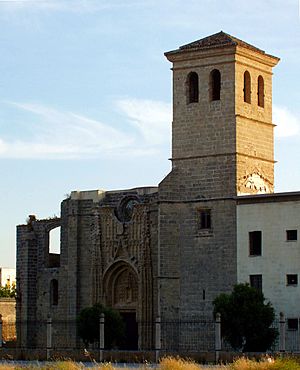Monasterio de la Victoria, Province of Cadiz facts for kids
Quick facts for kids Monasterio de la Victoria |
|
|---|---|
| Native name Spanish: Iglesia de la Prisión Central |
|
 |
|
| Location | El Puerto de Santa María, Cádiz, Spain |
| Official name: Iglesia de la Prisión Central, Iglesia del Monasterio de la Victoria | |
| Type | Non-movable |
| Criteria | Monument |
| Designated | 1978-12-29 |
| Reference no. | (R.I.) - 51 - 0004322 - 00000 |
| Lua error in Module:Location_map at line 420: attempt to index field 'wikibase' (a nil value). | |
The Monasterio de la Victoria is a very old building in El Puerto de Santa María, a town in southern Spain. It started as a monastery, which is a place where monks live and worship. This special building was constructed way back in the 16th century.
It was built by a powerful family called the Dukes of Medinaceli. For many years, it served as a religious center. But later, its purpose changed a lot. Between 1886 and 1981, this historic monastery was used as a prison.
Contents
A Building with Many Lives
The Monasterio de la Victoria has a long and interesting history. It has seen many changes over the centuries. From a peaceful home for monks, it became a place of confinement.
From Monastery to Prison
The change from a monastery to a prison happened in the late 1800s. This shows how buildings can be reused for different purposes over time. The strong walls and many rooms made it suitable for a prison.
Life as a Prison
During important times in Spanish history, the monastery served as a prison. This included the period of the Second Spanish Republic, which was a time when Spain tried a new form of government. It was also used during the Spanish Civil War, a big conflict in Spain, and later during Franco's Dictatorship.
Famous Prisoners
Many people were held in this prison. Some were ordinary criminals, but others were "political prisoners." These were people who were put in jail because their ideas or actions went against the government in power.
One famous political prisoner was Ramón Rubial. He later became the president of the Socialist Party, a major political group in Spain. Another well-known person held there was Eleuterio Sánchez, also known as "el Lute."
Why is it Important Today?
The Monasterio de la Victoria is important because it tells us about Spain's past. It shows how religious buildings can be adapted. It also reminds us of different periods in Spanish history, including times of political change and conflict. Today, it stands as a monument to its long and varied story.
See also
 In Spanish: Monasterio de la Victoria para niños
In Spanish: Monasterio de la Victoria para niños
 | DeHart Hubbard |
 | Wilma Rudolph |
 | Jesse Owens |
 | Jackie Joyner-Kersee |
 | Major Taylor |

